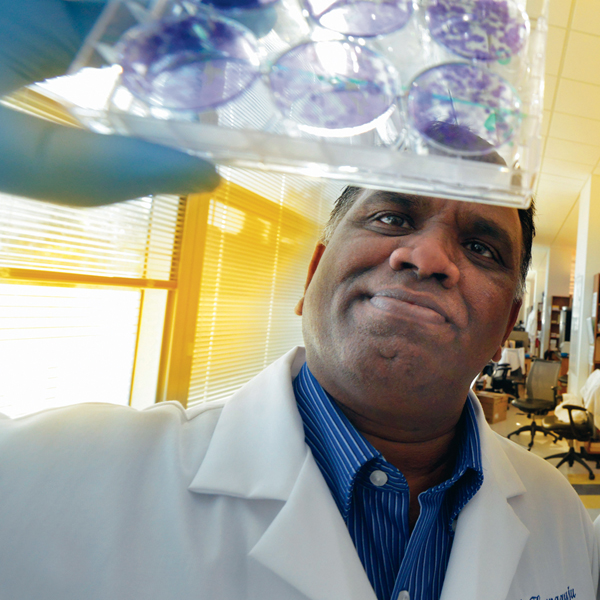
- Augusta University
- Georgia Cancer Center
- Research
- GCC Faculty Directory
- The Thangaraju Lab
The Thangaraju Lab
Muthusamy Thangaraju, PhD
Associate Professor, Department of Biochemistry and Molecular Biology
Research Summary
The main focus of the Thangaraju’s Laboratory is to identify the functional implication of DNA methyl transferases (DNMTs), histone methyl transferases (HMTs), and histone dimethyl transferases (HDACs) in regulation of mammary stem/progenitor and cancer stem cells. This laboratory is also involved in understanding the functional significance of mammary gland remodeling in regulation of multi-pregnancies associated breast cancer prevention.
Contact Us
The Muthusamy Thangaraju Lab
Health Sciences Campus
GCC - M. Bert Storey Research Building
1410 Laney Walker Blvd., CN-1161, Augusta, GA 30912
(706) 721-4219
Research Interests
Mammary stem/progenitor cells (MaSCs) maintain self-renewal of the mammary epithelium during puberty and pregnancy. DNA methylation provides a potential epigenetic mechanism for maintaining cellular memory during self-renewal. Although DNA methyltransferases (DNMTs) are dispensable for embryonic stem cell maintenance, their role in maintaining MaSCs and cancer stem cells (CSCs) in constantly replenishing mammary epithelium is unclear. The Thangaraju laboratory has recently shown that DNMT1 is indispensable for MaSC maintenance. Furthermore, they found that DNMT1 expression is elevated in mammary tumors, and mammary gland-specific DNMT1deletion protects mice from mammary tumorigenesis by limiting the CSC pool. Through genome-scale methylation studies, they identified ISL1 as a direct DNMT1 target, hypermethylated and downregulated in mammary tumors and CSCs. DNMT inhibition or ISL1 expression in breast cancer cells limits CSC population. Altogether, these studies uncover an essential role for DNMT1 in MaSC and CSC maintenance and identify the DNMT1-ISL1 axis as a potential therapeutic target for breast cancer treatment. This laboratory also identified a small molecule inhibitor that inhibits DNMT1 along with inhibition of histone methyltransferases (HMTs), like DOT1L, MLL1, NSD1, and SETD2. In addition, this small molecule inhibitor prevents breast cancer by blocking breast cancer stem cells, specifically basal myoepithelial stem cells. They are evaluating the therapeutic potential of this drug for breast cancer prevention and treatment.
The Thangaraju laboratory is also evaluating the role of the G-protein coupled receptor 109A (GPR109A), Niacin and Butyrate receptor, and membrane transporter SLC5A8, a butyrate receptor, in mammary gland remodeling and their relevance to breast cancer prevention and treatment. In addition, this laboratory is evaluating the functional implication of silent information regulator 1 (SIRT1) in the regulation of mammary gland development and its role in mammary tumor growth and progression. Some of the important projects ongoing and/or of interest in the group are:
- Functional relevance of mammary gland remodeling in prevention and treatment of breast cancer
- Role of epigenetic regulators in mammary stem/progenitor and cancer stem cells
- Identification of small molecule inhibitors to inhibit DNA methyltransferases (DNMTs) and histone methyltransferases (HMTs) and its relevance to regulation of breast cancer stem cells.
Selected Publications
Pathania P, Ramachandran S, Elangovan S, Padia R, Yang P, Cinghu S, Veeranan-Karmegam R, Arjunan P, Gnana-Prakasam J, Fulzele S, Pei L, Chang C-S, Choi J-H, Shi H, Manicassamy S, Prasad PD, Sharma S, Ganapathy V, Jothi R, Thangaraju M. (2015) DNMT1 is essential for mammary and cancer stem cell maintenance and tumorigenesis. Nature Comm. (In press)
Elangovan S, Pathania R, Ramachandran S, Ananth S, Padia RN, Lan L, Singh N, Martin PM, Hawthorn L, Prasad PD, Ganapathy V, Thangaraju M. (2014) The niacin/butyrate receptor GPR109A suppresses mammary tumorigenesis by inhibiting cell survival. Cancer Res. 74:1166-78.
Elangovan S, Ramachandran S, Venkatesan N, Ananth S, Gnana-Prakasam J, Martin PM, Browning DD, Schoenlein PV, Prasad PD, Ganapathy V, Thangaraju, M. (2011) SIRT1 is essential for oncogenic signaling by estrogen/estrogen receptor-α in breast cancer. Cancer Res. 71:6654-64.